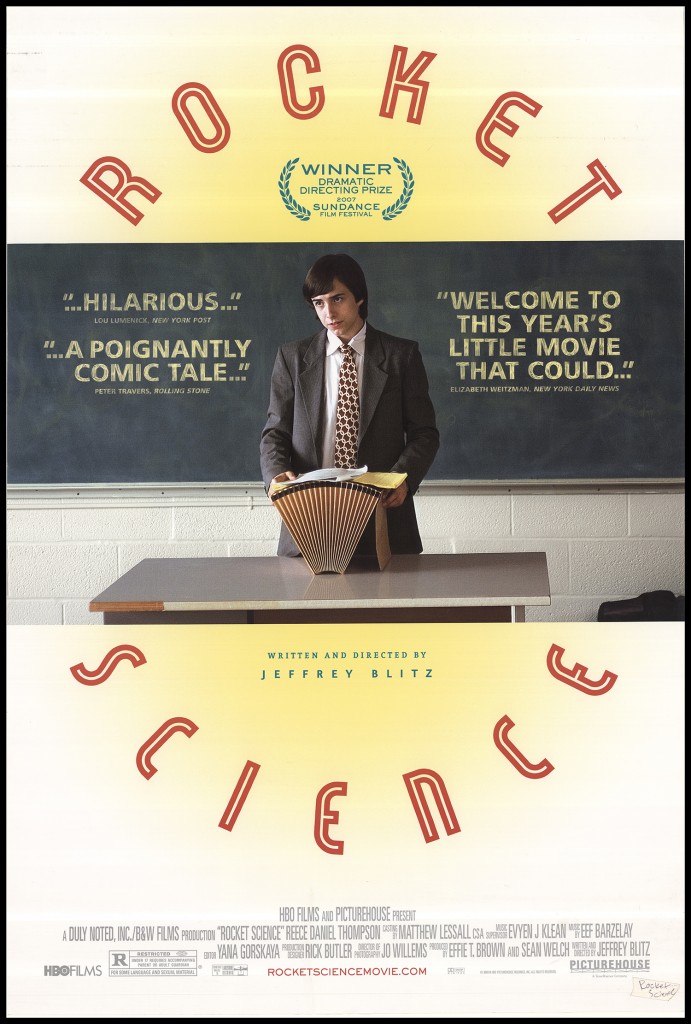
Movies that feature stuttering are few and far between, and they usually depict it unrealistically or for the laugh factor. There are exceptions, of course. In 2010, the The King’s Speech was released, an uplifting story about the struggles of King George VI as he unexpectedly assumes the throne of England. But three years earlier, to considerably less attention, launched a different film that also featured a stuttering protagonist, Rocket Science. The two films could not be more different.
Rocket Science is a relatively unknown 2007 comic gem. Reece Thompson stars as Hal Heffner, a teenager with a severe stutter who gets recruited into his high school debating team by a girl he has a crush on (the amazing Anna Kendrick). If you think this is a set up for a traditional Hollywood storyline — boy overcomes his stuttering, triumphs over his fears, and gets the girl — think again. The world of Rocket Science is way too cynical for that, and infinitely more clever.
Isolation and loneliness
Hal soon realize he is a victim of Ginny's larger ambitionsPoor Hal’s high school life is torture. He hides in a janitor closet after devastating exposures of his stuttering. He orders fish in the cafeteria because he can’t say “pizza.” But he is approached one day by the cunning Virginia “Ginny” Ryerson, the school’s star debater who needs a new debate partner for an upcoming contest. When he initially refuses on account of his stuttering, she implies she can help him with his speech and that he is an ideal partner because “deformed people are the best, they have deep resources of anger which serves them well.” So Hal and Ginny start spending time together researching and practicing to prepare for the debate, and also engaging in an impromptu kissing session. But Hal soon realizes he is one in a long list of victims of Ginny's larger ambitions.
The sting of betrayal
Ginny, as it turns out, is no saviour. No one, in fact, steps in to save Hal. Even his useless school-appointed speech therapist can only advise him to “go back to living the way you were before you tried to exceed your limitations.” Hal is left entirely to his own resources. But just as Ginny predicted, his inner resources turn out to be formidable.
No one steps in to save HalThe combination of anger, disappointment and heartbreak serve as an emotional cocktail that ignites a fire in Hal, knocking him out of his quiet passivity. After a hilarious drunken meltdown, he concocts a scheme to get back at Ginny and redeem himself, by forming an alliance with an important person from Ginny’s recent history who is the only one who can undermine her.
Looking inside ourselves
In the real world, change is incrementalThe finale to Rocket Science could be seen as anti-climactic. No Hollywood ending here. But it is the movie's refreshing lack of sentimentality that makes it so relatable. Cinematic storytelling naturally tend towards "saviour" stories: a rescuer, be it a girl/boyfriend, a parent, a teacher, a speech therapist, or a change of external circumstances provide more favourable conditions to allow for validation, for our protagonist to be annointed a hero, crowned a king. In the real world, change is a more incremental thing, and decidedly less dramatic. It comes from looking inside ourselves, and working with what we’ve got. Hal ultimately ends up able to laugh at himself, and start accepting who he is in the process, or, as the narrator puts it, “stopped wishing he sounded like anyone else, and just started talking as he was.” The offbeat exchange he has with his father at the end of the movie speaks volumes.
The music in Rocket Science is awesome too, with tracks by the dark 80s band Violent Femmes. If you haven’t seen Rocket Science, do so! If you saw it a long time ago, it’s worth a rewatch. It is available to rent or buy on Netflix and Amazon.